10 Things We Learned From WWE Survivor Series 2017
The one where Triple H turned on Kurt Angle and Raw, and then turned on Shane McMahon and SmackDown Live...
"It's the one night a year where Raw and SmackDown superstars go head to head."
WWE repeats that hackneyed and inaccurate phrase with such zealous frequency that you half expect Jack Torrance to descend into madness prior to typing that sentence thousands of times into a manuscript. That would certainly make The Shining more interesting, to see Nicholson don a red t-shirt before planting an axe into the torso of Scatman Crothers, bedecked in his Tuesday night blues.
Survivor Series 2017 followed a somewhat similar path as the previous year's event, in that there were some very good matches throughout the epic-length broadcast, only to have some glaring issues with the main event take precedence. And unlike the 2016 show, where Goldberg and Lesnar was a 90-second oddity, this finale dragged on for more than 30 minutes, with some participants looking like they'd seen far better days.
The Raw vs. SmackDown narrative deserves a hard push when it's executed, but this felt *too* pushed. Beginning with the conveniently-timed "siege" committed by Shane McMahon and SmackDown, the acrimony seemed to come out of nowhere, without any long-term build. It's just, "Oh, hey, November's coming - we need to invent tension." And nobody likes pre-fab conflict, do they?
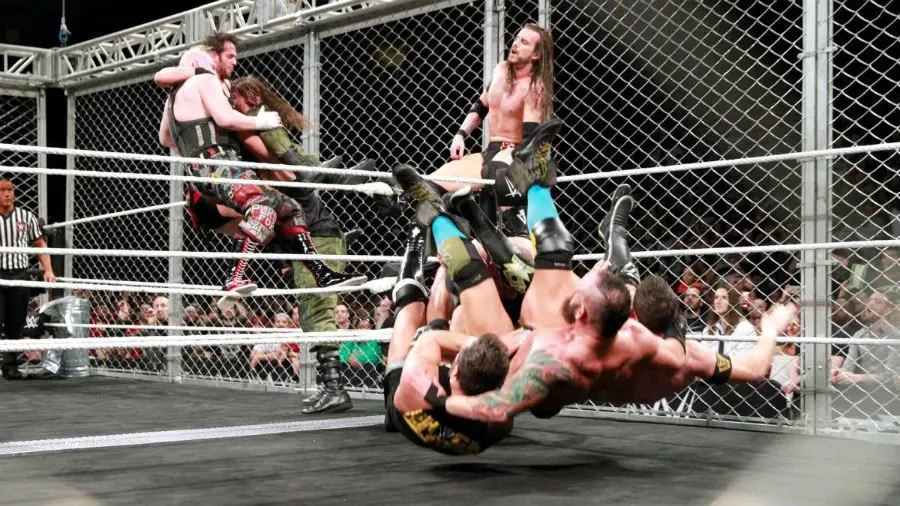 WWE
WWE
The 2017 Survivor Series drew 12,000+ fans to Houston's Toyota Center, going on second out of four consecutive nights of shows inside the building. The previous night, NXT put on their rendition of WarGames inside the same building, a show that would also include Andrade Almas' NXT Title win over Drew McIntyre, and the critically-acclaimed Aleister Black/Velveteen Dream match. Once more, the consensus had NXT outdoing the main roster effort.
Yet the attendance told a different story. While previous TakeOvers have done comparable attendances to their main show counterparts, the WarGames Takeover did only 5700 fans, less than half of Survivor Series' attendance. Dave Meltzer would note in The Wrestling Observer Newsletter that Survivor Series was the only event of the four show run (including Monday's Raw and Tuesday's SmackDown in the same building) where the upper deck was even opened up.
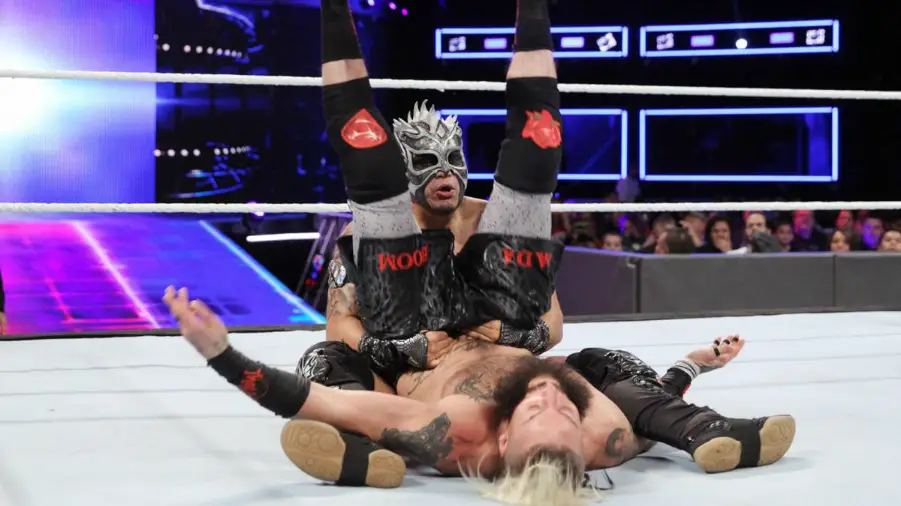 WWE
WWE
In a nine-minute match on the Kickoff Show, Cruiserweight Champion Enzo Amore (man, that sentence sounds so ancient) defeated Kalisto to retain the gold. The match wasn't particularly special, nor was the outcome anything to cause a paradigm shift. However, the match's pre-show placement would earn the overall event in question a special place in history.
Because of the champion vs. champion non-title matches up and down the main card, this marked the first Survivor Series PPV broadcast to have no title matches whatsoever since the 1990 edition. It also marked the first WWE pay-per-view overall without any main-card title matches since In Your House: International Incident in July 1996, where both singles champions (Shawn Michaels and Ahmed Johnson) competed in a six-man tag.
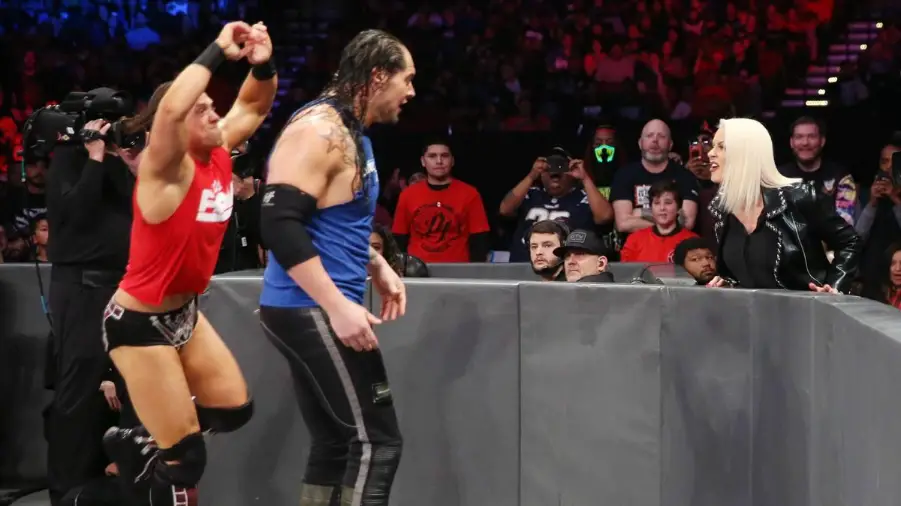 WWE
WWE
In setting up the four cross-brand champion vs. champion matches, WWE had to come up with a quartet of clashes that would appear to be competitive. In basing an entire promotional conflict around the strongest possible titleholders, it was up to WWE to ensure that the best combination was in place. That involved some last minute title changes.
Of those four matches, only Intercontinental Champion The Miz and US Champion Baron Corbin was locked in long-term. Each of the other three matches saw a title change within two weeks of Survivor Series, including Charlotte winning the SmackDown Womens' title from Natalya (five days before Survivor Series), and Cesaro and Sheamus winning the Raw Tag Team gold from Dean Ambrose and Seth Rollins (13 days prior). And there was one other one...
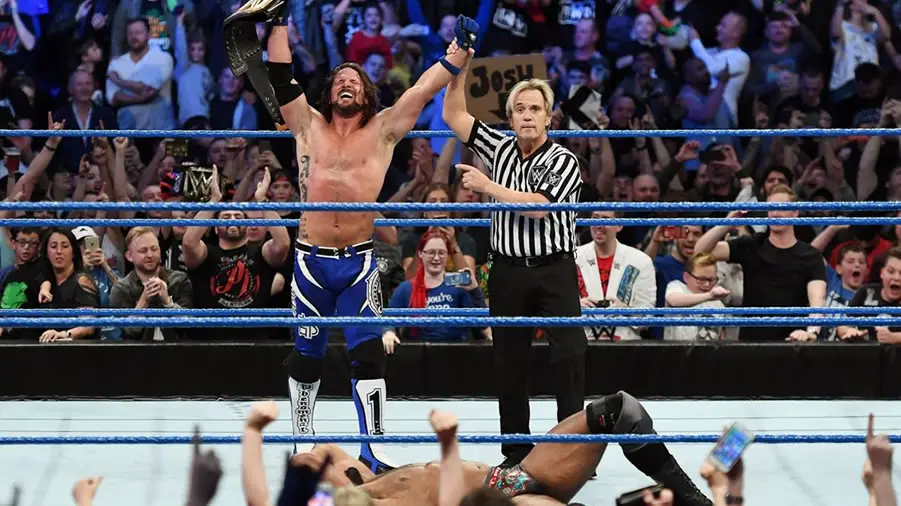 WWE
WWE
Jinder Mahal's reign as WWE Champion didn't exactly go the way WWE had hoped. Mahal was seen as more of a JBL-esque titleholder, one that irked fans, but didn't exactly invest them in his tentative downfall. When Brock Lesnar was matched up with Mahal for Survivor Series, there were scoffs and cackles, since 1) the result would hardly be in doubt, and 2) who the hell wanted to see it?
Mahal dropped the gold to AJ Styles in Manchester, England on 7 November, a title change that was surprising based on the original plan for Styles at Survivor Series. Initially, he was supposed to defeat Rusev in a Team SmackDown qualifier on the night that he ended up winning the belt, while Lesnar/Mahal (before the necessary change of heart on WWE's part) was a thing that was supposed to happen.
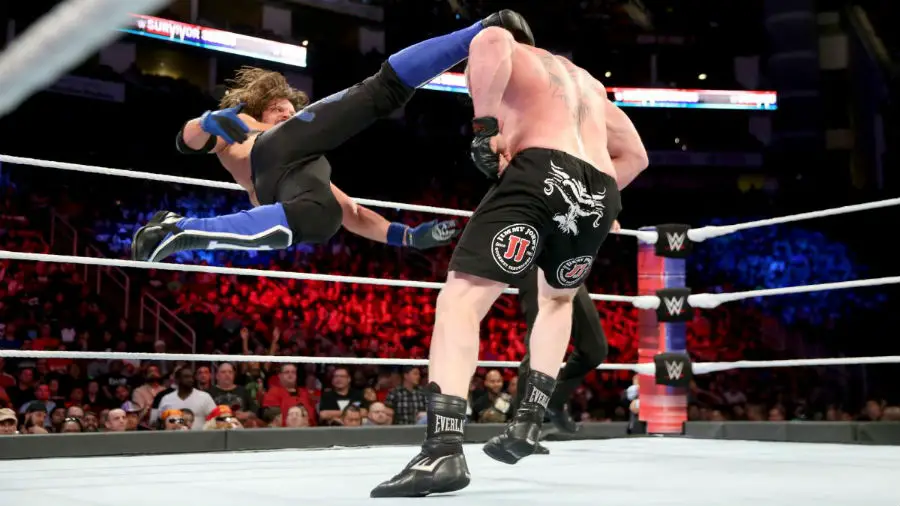 WWE
WWE
The near-unanimous pick for best match of the 2017 Survivor Series was Universal Champion Brock Lesnar's hard-hitting, tightly-contested battle against WWE Champion AJ Styles. The well-crafted David vs. Goliath match ended with a Lesnar victory, but it was many cuts above the more recent Lesnar fare, getting him out of his rote moveset and suddenly-simplistic formula.
The match would mark the first time that two former IWGP Heavyweight Champions faced off in a one-on-one WWE PPV match. For clarity's sake, it should be noted that the only four men that qualify as holders of said belt are Lesnar, Styles, Shinsuke Nakamura, and Vader (Kurt Angle's run as "Third Belt" champion is excluded). Styles would, of course, add to the collection with many matches against Nakamura in 2018.
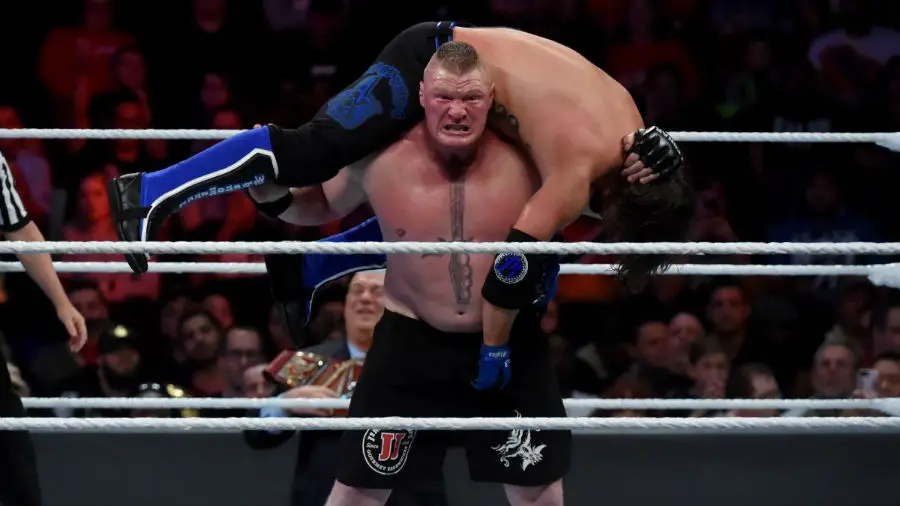 WWE
WWE
As noted, Lesnar's in-ring performances have become much more bare bones and routine over the past few years. His last great one-on-one match before duelling with Styles was easily his bloodbath with The Undertaker at Hell in a Cell 2015, as nothing in between (save for the brisk clash with Goldberg at WrestleMania 33, which was more novel than "great").
The win over Styles did afford Lesnar something he'd never had before: a victory at Survivor Series. Previously, Lesnar had never won at the event, going 0-3 overall. He lost to Big Show in 2002, tapped out to Chris Benoit in an elimination match in 2003, and after skipping a handful of the events this decade, lost to Goldberg in 2016. That's not to say Lesnar was entirely winless at November PPVs beforehand - just ask Randy Couture.
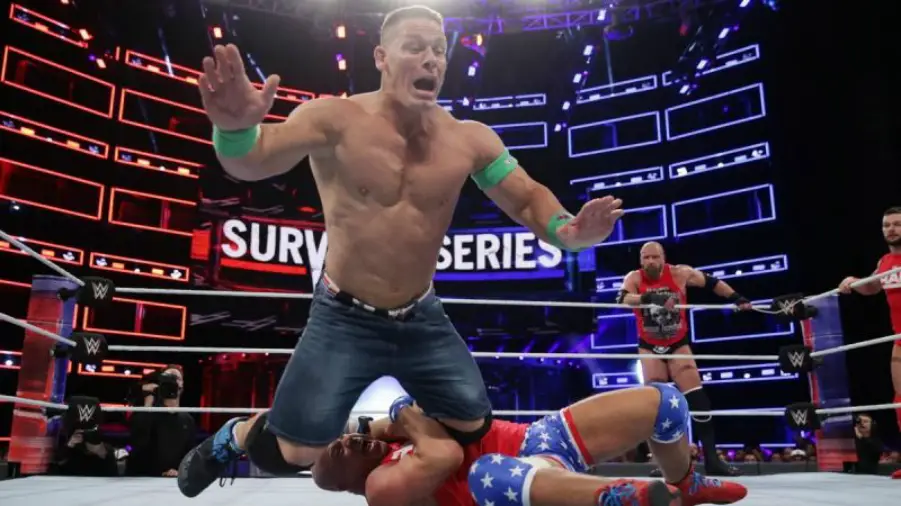 WWE
WWE
The final battle of the 2017 Survivor Series was a 10-man elimination match, and resembled something of an all-star game. When you include multi-time World Champions like John Cena, Randy Orton, Triple H, and Kurt Angle in one match, you're doing everything you can to up the auspiciousness of the fight. Cena added his share of prestige, though he wasn't originally intended for the match.
Cena ended up taking Styles' spot on Team SmackDown, just one of a handful of late changes made to make the show more palatable. The original plans for Cena, who was floating back and forth between brands as a magical "free agent", was to act as guest referee for the Lesnar/Mahal match, and wind up in a feud with Mahal after some late-match issue between them. Instead, Mahal was left off the show, and Styles reigned as WWE Champion for 53 weeks. How's *that* for a radical change?
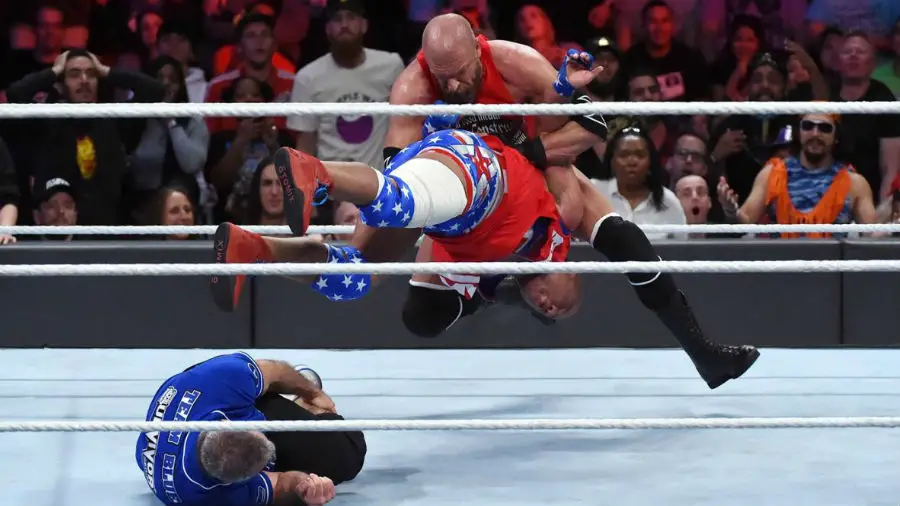 WWE
WWE
Was it really for the best that Triple H took out Jason Jordan, replacing him on Team Raw? Jordan's "spirited" promo about Survivor Series being the one night a year blah blah blah Royal Rumbles don't exist blah blah blah was worth seeing him get Pedigreed into oblivion, even if it meant one more part-timer was going to wrestle.
For Triple H, it marked the first time in eight years that he actually wrestled at Survivor Series. Generally a fixture at the event as an active wrestler (including taking part in five World title matches at the show), Helmsley's reduced schedule saw him make more time for WrestleMania and a handful of other shows, while eschewing Survivor Series outside of minimal physical involvement (2014 and 2015 come to mind).
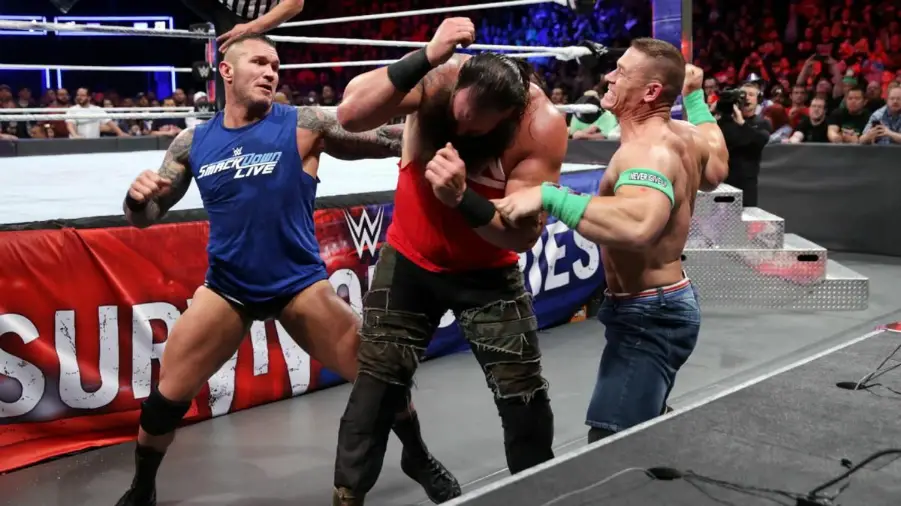 WWE
WWE
Randy Orton was one of the participants on Team SmackDown, matched up with old rivals Triple H and Kurt Angle once more. Orton's experience in these types of matches should earn him the Shawn Michaels-esque nickname of "Mr. Survivor Series", as it marked the 10th time that The Viper competed in an elimination bout, a run that began back at the 2003 show.
Orton was the next to last man to be eliminated, falling victim to Braun Strowman's Powerslam, leading to this amazing stat: it was the first time that Orton failed to survive *and* wasn't the last elimination. Orton has survived five times (2003-05, 2008, 2016) and was the final elimination four other times (2006, 2009, 2011, 2012). This time, he was unable to claim either result, a first in 10 tries.
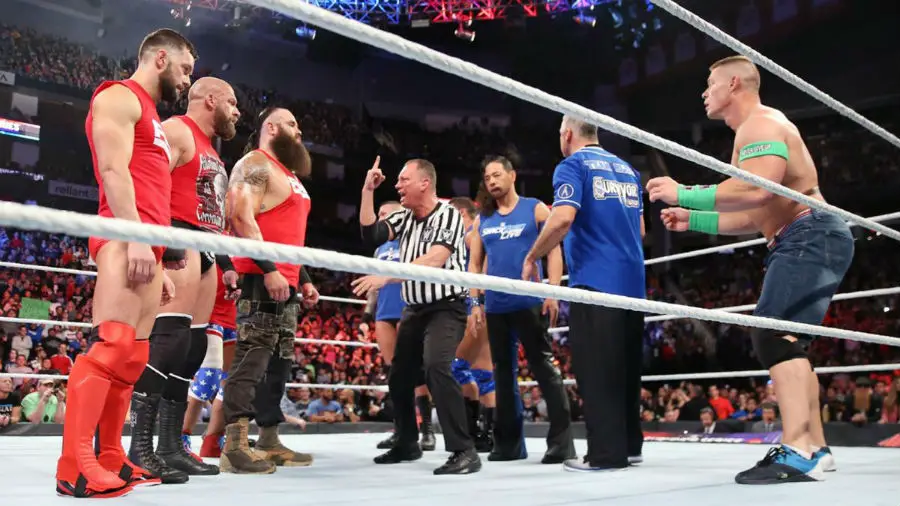 WWE
WWE
As of this writing, there are five former WWE Champions that are each younger than the first WrestleMania - all three Shield members, Jinder Mahal, and Bray Wyatt. We're at the point now where you can be younger than WrestleMania I *and* be a 10 or 15-year wrestling veteran. But in part-timer-friendly WWE, what is age, really?
In that final Survivor Series match, all 10 men were *older* than WrestleMania I, with Braun Strowman being the youngest, aged 34 at the time. The rest, in ascending order, included Finn Balor (36), Randy Orton (37), Shinsuke Nakamura (37), Samoa Joe (38), Bobby Roode (40), John Cena (40), Shane McMahon (47), Triple H (48), and Kurt Angle (48). That's a median age of 40.5 years old among 10 men, which would make this group the WWE equivalent of The Expendables.
WWE repeats that hackneyed and inaccurate phrase with such zealous frequency that you half expect Jack Torrance to descend into madness prior to typing that sentence thousands of times into a manuscript. That would certainly make The Shining more interesting, to see Nicholson don a red t-shirt before planting an axe into the torso of Scatman Crothers, bedecked in his Tuesday night blues.
Survivor Series 2017 followed a somewhat similar path as the previous year's event, in that there were some very good matches throughout the epic-length broadcast, only to have some glaring issues with the main event take precedence. And unlike the 2016 show, where Goldberg and Lesnar was a 90-second oddity, this finale dragged on for more than 30 minutes, with some participants looking like they'd seen far better days.
The Raw vs. SmackDown narrative deserves a hard push when it's executed, but this felt *too* pushed. Beginning with the conveniently-timed "siege" committed by Shane McMahon and SmackDown, the acrimony seemed to come out of nowhere, without any long-term build. It's just, "Oh, hey, November's coming - we need to invent tension." And nobody likes pre-fab conflict, do they?
10. Sunday After NXT
 WWE
WWEThe 2017 Survivor Series drew 12,000+ fans to Houston's Toyota Center, going on second out of four consecutive nights of shows inside the building. The previous night, NXT put on their rendition of WarGames inside the same building, a show that would also include Andrade Almas' NXT Title win over Drew McIntyre, and the critically-acclaimed Aleister Black/Velveteen Dream match. Once more, the consensus had NXT outdoing the main roster effort.
Yet the attendance told a different story. While previous TakeOvers have done comparable attendances to their main show counterparts, the WarGames Takeover did only 5700 fans, less than half of Survivor Series' attendance. Dave Meltzer would note in The Wrestling Observer Newsletter that Survivor Series was the only event of the four show run (including Monday's Raw and Tuesday's SmackDown in the same building) where the upper deck was even opened up.
9. Scarcity Of Gold
 WWE
WWEIn a nine-minute match on the Kickoff Show, Cruiserweight Champion Enzo Amore (man, that sentence sounds so ancient) defeated Kalisto to retain the gold. The match wasn't particularly special, nor was the outcome anything to cause a paradigm shift. However, the match's pre-show placement would earn the overall event in question a special place in history.
Because of the champion vs. champion non-title matches up and down the main card, this marked the first Survivor Series PPV broadcast to have no title matches whatsoever since the 1990 edition. It also marked the first WWE pay-per-view overall without any main-card title matches since In Your House: International Incident in July 1996, where both singles champions (Shawn Michaels and Ahmed Johnson) competed in a six-man tag.
8. Championship Sliding Puzzle
 WWE
WWEIn setting up the four cross-brand champion vs. champion matches, WWE had to come up with a quartet of clashes that would appear to be competitive. In basing an entire promotional conflict around the strongest possible titleholders, it was up to WWE to ensure that the best combination was in place. That involved some last minute title changes.
Of those four matches, only Intercontinental Champion The Miz and US Champion Baron Corbin was locked in long-term. Each of the other three matches saw a title change within two weeks of Survivor Series, including Charlotte winning the SmackDown Womens' title from Natalya (five days before Survivor Series), and Cesaro and Sheamus winning the Raw Tag Team gold from Dean Ambrose and Seth Rollins (13 days prior). And there was one other one...
7. Changes For The Better
 WWE
WWEJinder Mahal's reign as WWE Champion didn't exactly go the way WWE had hoped. Mahal was seen as more of a JBL-esque titleholder, one that irked fans, but didn't exactly invest them in his tentative downfall. When Brock Lesnar was matched up with Mahal for Survivor Series, there were scoffs and cackles, since 1) the result would hardly be in doubt, and 2) who the hell wanted to see it?
Mahal dropped the gold to AJ Styles in Manchester, England on 7 November, a title change that was surprising based on the original plan for Styles at Survivor Series. Initially, he was supposed to defeat Rusev in a Team SmackDown qualifier on the night that he ended up winning the belt, while Lesnar/Mahal (before the necessary change of heart on WWE's part) was a thing that was supposed to happen.
6. Sports Entertainment Grand Prix
 WWE
WWEThe near-unanimous pick for best match of the 2017 Survivor Series was Universal Champion Brock Lesnar's hard-hitting, tightly-contested battle against WWE Champion AJ Styles. The well-crafted David vs. Goliath match ended with a Lesnar victory, but it was many cuts above the more recent Lesnar fare, getting him out of his rote moveset and suddenly-simplistic formula.
The match would mark the first time that two former IWGP Heavyweight Champions faced off in a one-on-one WWE PPV match. For clarity's sake, it should be noted that the only four men that qualify as holders of said belt are Lesnar, Styles, Shinsuke Nakamura, and Vader (Kurt Angle's run as "Third Belt" champion is excluded). Styles would, of course, add to the collection with many matches against Nakamura in 2018.
5. Survivor Incarnate
 WWE
WWEAs noted, Lesnar's in-ring performances have become much more bare bones and routine over the past few years. His last great one-on-one match before duelling with Styles was easily his bloodbath with The Undertaker at Hell in a Cell 2015, as nothing in between (save for the brisk clash with Goldberg at WrestleMania 33, which was more novel than "great").
The win over Styles did afford Lesnar something he'd never had before: a victory at Survivor Series. Previously, Lesnar had never won at the event, going 0-3 overall. He lost to Big Show in 2002, tapped out to Chris Benoit in an elimination match in 2003, and after skipping a handful of the events this decade, lost to Goldberg in 2016. That's not to say Lesnar was entirely winless at November PPVs beforehand - just ask Randy Couture.
4. Cena's Official Capacity
 WWE
WWEThe final battle of the 2017 Survivor Series was a 10-man elimination match, and resembled something of an all-star game. When you include multi-time World Champions like John Cena, Randy Orton, Triple H, and Kurt Angle in one match, you're doing everything you can to up the auspiciousness of the fight. Cena added his share of prestige, though he wasn't originally intended for the match.
Cena ended up taking Styles' spot on Team SmackDown, just one of a handful of late changes made to make the show more palatable. The original plans for Cena, who was floating back and forth between brands as a magical "free agent", was to act as guest referee for the Lesnar/Mahal match, and wind up in a feud with Mahal after some late-match issue between them. Instead, Mahal was left off the show, and Styles reigned as WWE Champion for 53 weeks. How's *that* for a radical change?
3. Boss Battle
 WWE
WWEWas it really for the best that Triple H took out Jason Jordan, replacing him on Team Raw? Jordan's "spirited" promo about Survivor Series being the one night a year blah blah blah Royal Rumbles don't exist blah blah blah was worth seeing him get Pedigreed into oblivion, even if it meant one more part-timer was going to wrestle.
For Triple H, it marked the first time in eight years that he actually wrestled at Survivor Series. Generally a fixture at the event as an active wrestler (including taking part in five World title matches at the show), Helmsley's reduced schedule saw him make more time for WrestleMania and a handful of other shows, while eschewing Survivor Series outside of minimal physical involvement (2014 and 2015 come to mind).
2. Elimination Outta Nowhere
 WWE
WWERandy Orton was one of the participants on Team SmackDown, matched up with old rivals Triple H and Kurt Angle once more. Orton's experience in these types of matches should earn him the Shawn Michaels-esque nickname of "Mr. Survivor Series", as it marked the 10th time that The Viper competed in an elimination bout, a run that began back at the 2003 show.
Orton was the next to last man to be eliminated, falling victim to Braun Strowman's Powerslam, leading to this amazing stat: it was the first time that Orton failed to survive *and* wasn't the last elimination. Orton has survived five times (2003-05, 2008, 2016) and was the final elimination four other times (2006, 2009, 2011, 2012). This time, he was unable to claim either result, a first in 10 tries.
1. What's My Age Again?
 WWE
WWEAs of this writing, there are five former WWE Champions that are each younger than the first WrestleMania - all three Shield members, Jinder Mahal, and Bray Wyatt. We're at the point now where you can be younger than WrestleMania I *and* be a 10 or 15-year wrestling veteran. But in part-timer-friendly WWE, what is age, really?
In that final Survivor Series match, all 10 men were *older* than WrestleMania I, with Braun Strowman being the youngest, aged 34 at the time. The rest, in ascending order, included Finn Balor (36), Randy Orton (37), Shinsuke Nakamura (37), Samoa Joe (38), Bobby Roode (40), John Cena (40), Shane McMahon (47), Triple H (48), and Kurt Angle (48). That's a median age of 40.5 years old among 10 men, which would make this group the WWE equivalent of The Expendables.
